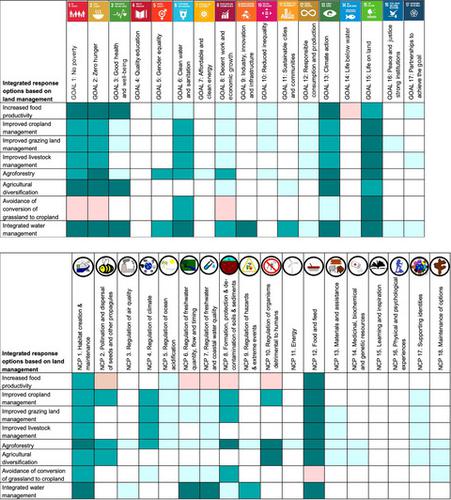当前位置:
X-MOL 学术
›
Glob. Change Biol.
›
论文详情
Our official English website, www.x-mol.net, welcomes your
feedback! (Note: you will need to create a separate account there.)
The impact of interventions in the global land and agri-food sectors on Nature's Contributions to People and the UN Sustainable Development Goals.
Global Change Biology ( IF 10.8 ) Pub Date : 2020-06-12 , DOI: 10.1111/gcb.15219 Pamela McElwee 1 , Katherine Calvin 2 , Donovan Campbell 3 , Francesco Cherubini 4 , Giacomo Grassi 5 , Vladimir Korotkov 6 , Anh Le Hoang 7 , Shuaib Lwasa 8 , Johnson Nkem 9 , Ephraim Nkonya 10 , Nobuko Saigusa 11 , Jean-Francois Soussana 12 , Miguel Angel Taboada 13 , Frances Manning 14 , Dorothy Nampanzira 15 , Pete Smith 14
Global Change Biology ( IF 10.8 ) Pub Date : 2020-06-12 , DOI: 10.1111/gcb.15219 Pamela McElwee 1 , Katherine Calvin 2 , Donovan Campbell 3 , Francesco Cherubini 4 , Giacomo Grassi 5 , Vladimir Korotkov 6 , Anh Le Hoang 7 , Shuaib Lwasa 8 , Johnson Nkem 9 , Ephraim Nkonya 10 , Nobuko Saigusa 11 , Jean-Francois Soussana 12 , Miguel Angel Taboada 13 , Frances Manning 14 , Dorothy Nampanzira 15 , Pete Smith 14
Affiliation

|
Interlocked challenges of climate change, biodiversity loss, and land degradation require transformative interventions in the land management and food production sectors to reduce carbon emissions, strengthen adaptive capacity, and increase food security. However, deciding which interventions to pursue and understanding their relative co‐benefits with and trade‐offs against different social and environmental goals have been difficult without comparisons across a range of possible actions. This study examined 40 different options, implemented through land management, value chains, or risk management, for their relative impacts across 18 Nature's Contributions to People (NCPs) and the 17 Sustainable Development Goals (SDGs). We find that a relatively small number of interventions show positive synergies with both SDGs and NCPs with no significant adverse trade‐offs; these include improved cropland management, improved grazing land management, improved livestock management, agroforestry, integrated water management, increased soil organic carbon content, reduced soil erosion, salinization, and compaction, fire management, reduced landslides and hazards, reduced pollution, reduced post‐harvest losses, improved energy use in food systems, and disaster risk management. Several interventions show potentially significant negative impacts on both SDGs and NCPs; these include bioenergy and bioenergy with carbon capture and storage, afforestation, and some risk sharing measures, like commercial crop insurance. Our results demonstrate that a better understanding of co‐benefits and trade‐offs of different policy approaches can help decision‐makers choose the more effective, or at the very minimum, more benign interventions for implementation.
中文翻译:

全球土地和农业食品部门的干预措施对自然对人类的贡献和联合国可持续发展目标的影响。
气候变化,生物多样性丧失和土地退化等相互关联的挑战要求对土地管理和粮食生产部门进行变革性干预,以减少碳排放,增强适应能力并提高粮食安全。但是,如果不对一系列可能的行动进行比较,就很难决定要采取哪些干预措施并了解其与不同社会和环境目标的相对共同利益以及如何权衡取舍。这项研究研究了40种不同的选择,这些选择是通过土地管理,价值链或风险管理来实现的,它们对18个自然对人类的贡献(NCP)和17个可持续发展目标(SDG)的相对影响。我们发现,相对较少的干预措施与可持续发展目标和国家协调计划都显示出积极的协同作用,而没有重大的不利权衡。这些包括改善耕地管理,改善牧场管理,改善牲畜管理,农林业,综合水资源管理,增加土壤有机碳含量,减少土壤侵蚀,盐碱化和压实,防火管理,减少滑坡和危害,减少污染,减少后收获损失,改善粮食系统的能源使用量以及灾害风险管理。一些干预措施显示出对可持续发展目标和国家联络点都有潜在的重大负面影响;其中包括生物能源和具有碳捕集与封存的生物能源,造林和一些风险分担措施,例如商业作物保险。
更新日期:2020-08-11
中文翻译:

全球土地和农业食品部门的干预措施对自然对人类的贡献和联合国可持续发展目标的影响。
气候变化,生物多样性丧失和土地退化等相互关联的挑战要求对土地管理和粮食生产部门进行变革性干预,以减少碳排放,增强适应能力并提高粮食安全。但是,如果不对一系列可能的行动进行比较,就很难决定要采取哪些干预措施并了解其与不同社会和环境目标的相对共同利益以及如何权衡取舍。这项研究研究了40种不同的选择,这些选择是通过土地管理,价值链或风险管理来实现的,它们对18个自然对人类的贡献(NCP)和17个可持续发展目标(SDG)的相对影响。我们发现,相对较少的干预措施与可持续发展目标和国家协调计划都显示出积极的协同作用,而没有重大的不利权衡。这些包括改善耕地管理,改善牧场管理,改善牲畜管理,农林业,综合水资源管理,增加土壤有机碳含量,减少土壤侵蚀,盐碱化和压实,防火管理,减少滑坡和危害,减少污染,减少后收获损失,改善粮食系统的能源使用量以及灾害风险管理。一些干预措施显示出对可持续发展目标和国家联络点都有潜在的重大负面影响;其中包括生物能源和具有碳捕集与封存的生物能源,造林和一些风险分担措施,例如商业作物保险。











































 京公网安备 11010802027423号
京公网安备 11010802027423号